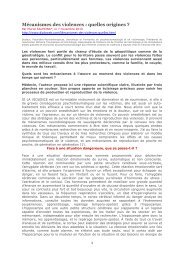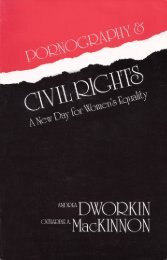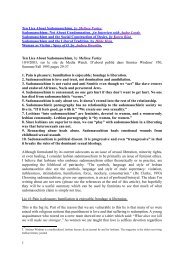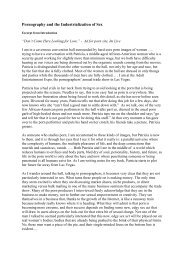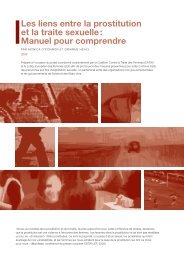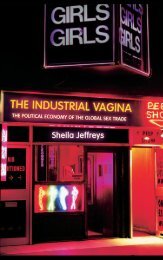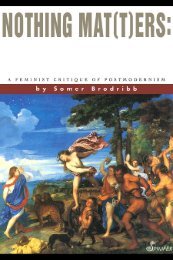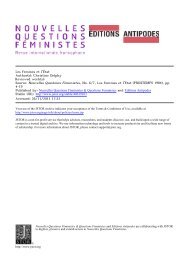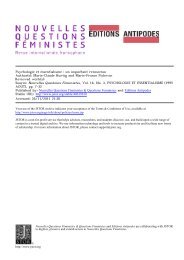- Page 1 and 2:
BY THE WINNER OF THE 2009 RACHEL CA
- Page 3 and 4:
Also by Marie-Monique RobinVoleurs
- Page 5 and 6:
The New Press gratefully acknowledg
- Page 8 and 9:
ContentsPreface: A Book for Public
- Page 10 and 11:
PrefaceA Book for Public HealthNico
- Page 12 and 13:
prefacexirifying reality. For, in t
- Page 14 and 15:
IntroductionThe Monsanto Question
- Page 16 and 17:
introduction 3as “an agricultural
- Page 18 and 19:
introduction 5Confronted with this
- Page 20:
part iOne of the Great Pollutersof
- Page 23 and 24:
10 the world according to monsantol
- Page 25 and 26:
12 the world according to monsantol
- Page 27 and 28:
14 the world according to monsantoi
- Page 29 and 30:
16 the world according to monsantoo
- Page 31 and 32:
18 the world according to monsantot
- Page 33 and 34:
20 the world according to monsantob
- Page 36 and 37:
pcbs: white-collar crime 23nately,
- Page 38 and 39:
pcbs: white-collar crime 25United S
- Page 40 and 41:
pcbs: white-collar crime 27that Mon
- Page 42 and 43:
pcbs: white-collar crime 29PCBs Are
- Page 44 and 45:
dioxin: a polluter working with the
- Page 46 and 47:
dioxin: a polluter working with the
- Page 48 and 49:
dioxin: a polluter working with the
- Page 50 and 51:
dioxin: a polluter working with the
- Page 52 and 53:
dioxin: a polluter working with the
- Page 54 and 55:
dioxin: a polluter working with the
- Page 56 and 57:
dioxin: a polluter working with the
- Page 58 and 59:
dioxin: a polluter working with the
- Page 60 and 61:
dioxin: a polluter working with the
- Page 62 and 63:
dioxin: manipulation and corruption
- Page 64 and 65:
dioxin: manipulation and corruption
- Page 66 and 67:
dioxin: manipulation and corruption
- Page 68 and 69:
dioxin: manipulation and corruption
- Page 70 and 71:
dioxin: manipulation and corruption
- Page 72 and 73:
dioxin: manipulation and corruption
- Page 74 and 75:
dioxin: manipulation and corruption
- Page 76 and 77:
dioxin: manipulation and corruption
- Page 78 and 79:
dioxin: manipulation and corruption
- Page 80 and 81:
dioxin: manipulation and corruption
- Page 82 and 83:
4Roundup: A MassiveBrainwashing Ope
- Page 84 and 85:
oundup: a massive brainwashing oper
- Page 86 and 87:
oundup: a massive brainwashing oper
- Page 88 and 89:
oundup: a massive brainwashing oper
- Page 90 and 91:
oundup: a massive brainwashing oper
- Page 92 and 93:
oundup: a massive brainwashing oper
- Page 94 and 95:
oundup: a massive brainwashing oper
- Page 96 and 97:
oundup: a massive brainwashing oper
- Page 98 and 99:
oundup: a massive brainwashing oper
- Page 100 and 101:
oundup: a massive brainwashing oper
- Page 102 and 103:
5The Bovine Growth Hormone Affair,P
- Page 104 and 105:
the bovine growth hormone affair, p
- Page 106 and 107:
the bovine growth hormone affair, p
- Page 108 and 109:
the bovine growth hormone affair, p
- Page 110 and 111:
the bovine growth hormone affair, p
- Page 112 and 113:
the bovine growth hormone affair, p
- Page 114 and 115:
the bovine growth hormone affair, p
- Page 116 and 117:
the bovine growth hormone affair, p
- Page 118 and 119:
the bovine growth hormone affair, p
- Page 120 and 121:
the bovine growth hormone affair, p
- Page 122 and 123:
the bovine growth hormone affair, p
- Page 124 and 125:
the bovine growth hormone affair, p
- Page 126 and 127:
the bovine growth hormone affair, p
- Page 128 and 129:
the bovine growth hormone affair, p
- Page 130 and 131:
the bovine growth hormone affair, p
- Page 132 and 133:
the bovine growth hormone affair, p
- Page 134 and 135:
the bovine growth hormone affair, p
- Page 136 and 137:
the bovine growth hormone affair, p
- Page 138 and 139:
the bovine growth hormone affair, p
- Page 140 and 141:
the bovine growth hormone affair, p
- Page 142:
part iiGMOs: The Great Conspiracy
- Page 145 and 146:
132 the world according to monsanto
- Page 147 and 148:
134 the world according to monsanto
- Page 149 and 150:
136 the world according to monsanto
- Page 151 and 152:
138 the world according to monsanto
- Page 153 and 154:
140 the world according to monsanto
- Page 155 and 156:
142 the world according to monsanto
- Page 157 and 158:
144 the world according to monsanto
- Page 159 and 160:
146 the world according to monsanto
- Page 161 and 162:
148 the world according to monsanto
- Page 163 and 164:
150 the world according to monsanto
- Page 165 and 166:
152 the world according to monsanto
- Page 167 and 168:
154 the world according to monsanto
- Page 169 and 170:
156 the world according to monsanto
- Page 171 and 172:
158 the world according to monsanto
- Page 173 and 174:
160 the world according to monsanto
- Page 175 and 176:
162 the world according to monsanto
- Page 177 and 178:
164 the world according to monsanto
- Page 179 and 180:
166 the world according to monsanto
- Page 181 and 182:
168 the world according to monsanto
- Page 183 and 184:
170 the world according to monsanto
- Page 185 and 186:
172 the world according to monsanto
- Page 187 and 188:
174 the world according to monsanto
- Page 189 and 190:
176 the world according to monsanto
- Page 191 and 192:
9Monsanto Weaves Its Web, 1995-1999
- Page 193 and 194:
180 the world according to monsanto
- Page 195 and 196:
182 the world according to monsanto
- Page 197 and 198:
184 the world according to monsanto
- Page 199 and 200:
186 the world according to monsanto
- Page 201 and 202:
188 the world according to monsanto
- Page 203 and 204:
190 the world according to monsanto
- Page 205 and 206:
192 the world according to monsanto
- Page 207 and 208:
194 the world according to monsanto
- Page 209 and 210:
196 the world according to monsanto
- Page 211 and 212:
198 the world according to monsanto
- Page 213 and 214:
200 the world according to monsanto
- Page 215 and 216:
202 the world according to monsanto
- Page 217 and 218:
204 the world according to monsanto
- Page 219 and 220:
206 the world according to monsanto
- Page 221 and 222:
208 the world according to monsanto
- Page 223 and 224:
210 the world according to monsanto
- Page 225 and 226:
212 the world according to monsanto
- Page 227 and 228:
214 the world according to monsanto
- Page 229 and 230:
216 the world according to monsanto
- Page 231 and 232:
218 the world according to monsanto
- Page 233 and 234:
220 the world according to monsanto
- Page 235 and 236:
222 the world according to monsanto
- Page 237 and 238:
224 the world according to monsanto
- Page 239 and 240:
226 the world according to monsanto
- Page 241 and 242:
228 the world according to monsanto
- Page 243 and 244:
230 the world according to monsanto
- Page 245 and 246:
232 the world according to monsanto
- Page 247 and 248:
234 the world according to monsanto
- Page 249 and 250: 236 the world according to monsanto
- Page 251 and 252: 238 the world according to monsanto
- Page 254: part iiiMonsanto’s GMOsStorm the
- Page 257 and 258: 244 the world according to monsanto
- Page 259 and 260: 246 the world according to monsanto
- Page 261 and 262: 248 the world according to monsanto
- Page 263 and 264: 250 the world according to monsanto
- Page 265 and 266: 252 the world according to monsanto
- Page 267 and 268: 254 the world according to monsanto
- Page 269 and 270: 13In Argentina: The Soybeans of Hun
- Page 271 and 272: 258 the world according to monsanto
- Page 273 and 274: 260 the world according to monsanto
- Page 275 and 276: 262 the world according to monsanto
- Page 277 and 278: 264 the world according to monsanto
- Page 279 and 280: 266 the world according to monsanto
- Page 281 and 282: 268 the world according to monsanto
- Page 283 and 284: 270 the world according to monsanto
- Page 285 and 286: 272 the world according to monsanto
- Page 287 and 288: 274 the world according to monsanto
- Page 289 and 290: 276 the world according to monsanto
- Page 291 and 292: 278 the world according to monsanto
- Page 293 and 294: 280 the world according to monsanto
- Page 295 and 296: 282 the world according to monsanto
- Page 297 and 298: 284 the world according to monsanto
- Page 299: 286 the world according to monsanto
- Page 303 and 304: 15India: The Seeds of SuicideOur pr
- Page 305 and 306: 292 the world according to monsanto
- Page 307 and 308: 294 the world according to monsanto
- Page 309 and 310: 296 the world according to monsanto
- Page 311 and 312: 298 the world according to monsanto
- Page 313 and 314: 300 the world according to monsanto
- Page 315 and 316: 302 the world according to monsanto
- Page 317 and 318: 304 the world according to monsanto
- Page 319 and 320: 306 the world according to monsanto
- Page 321 and 322: 308 the world according to monsanto
- Page 323 and 324: 310 the world according to monsanto
- Page 325 and 326: 312 the world according to monsanto
- Page 327 and 328: 314 the world according to monsanto
- Page 329 and 330: 316 the world according to monsanto
- Page 331 and 332: ConclusionA Colossus with Feet of C
- Page 333 and 334: 320 the world according to monsanto
- Page 335 and 336: 322 the world according to monsanto
- Page 337 and 338: 324 the world according to monsanto
- Page 339 and 340: 326 the world according to monsanto
- Page 341 and 342: 328 the world according to monsanto
- Page 344 and 345: NotesIntroduction: The Monsanto Que
- Page 346 and 347: notes to pages 34-46 3335. New York
- Page 348 and 349: notes to pages 53-62 335santo in an
- Page 350 and 351:
notes to pages 72-79 3373. Problems
- Page 352 and 353:
notes to pages 87-101 339Glyphosate
- Page 354 and 355:
notes to pages 118-142 34112. Their
- Page 356 and 357:
notes to pages 153-157 343US Law,
- Page 358 and 359:
notes to pages 174-184 345dients Co
- Page 360 and 361:
notes to pages 199-208 347demned fo
- Page 362 and 363:
notes to pages 217-223 34939. The G
- Page 364 and 365:
notes to pages 230-234 35114. Herv
- Page 366 and 367:
notes to pages 247-253 3537. Robert
- Page 368 and 369:
notes to pages 297-304 355Timothy M
- Page 370 and 371:
notes to pages 320-328 357Conclusio
- Page 372 and 373:
IndexAapresid (Argentine Associatio
- Page 374 and 375:
INDEX 361failures, 298-300; first f
- Page 376 and 377:
INDEX 363Edwards, David, 49Eid Parr
- Page 378 and 379:
INDEX 365Hansen, Michael, 97-99, 10
- Page 380 and 381:
INDEX 367McDermott, Tom, 111McDonal
- Page 382 and 383:
INDEX 369President’s Advisory Com
- Page 384 and 385:
INDEX 371T.H. Agriculture & Nutriti



